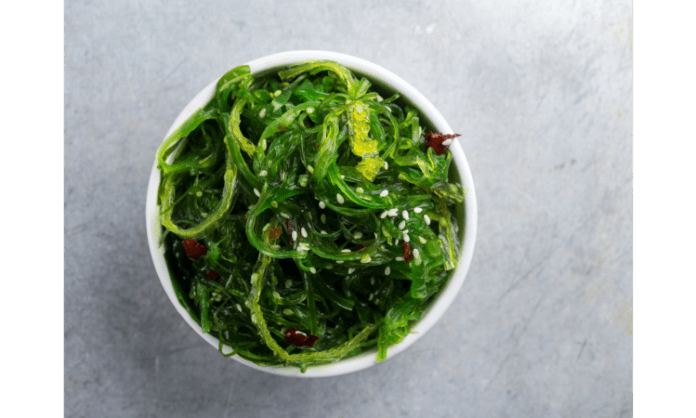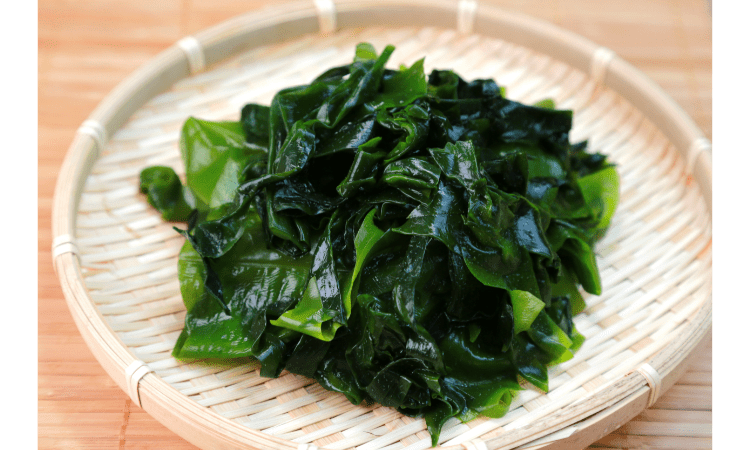
Seaweed is a form of algae that grows in the ocean. It contains vitamins, minerals, and antioxidants that can help promote your overall health. While it’s not as popular as other superfoods like kale or spinach, seaweed has been around for thousands of years and is a staple of Japanese cuisine. In this article, we’ll discuss the many health benefits of including seaweed in your diet.
What is seaweed?

Seaweed is a type of marine algae that grows in oceans and waterways. It’s often found along the coastlines, but it can also grow in fresh water. Some people call seaweed sea vegetables or sea lettuce, but these terms aren’t technically correct because it isn’t really a vegetable.
It has been used for centuries in Asian cuisine(wrapped sushi), and more recently, it has become popular in Western countries and all over the world as well.
Types of seaweed

Seaweed is a type of marine algae that grows in the ocean. They can be used in food, medicine, and cosmetics.
It is a vital source of protein, vitamins, minerals, and fiber. There are many different types of seaweed. Some types include dulse (a red seaweed), kombu (brown), wakame (green), and hijiki (black seaweed). These are just a few examples out of many different types available in stores today.
How to use seaweed?

When it comes to using seaweed, the possibilities are endless. You can add it to a variety of dishes and recipes to increase your intake of this superfood. Here are just a few examples:
● Salads – There are many ways you can incorporate them into your salads. You can add it in a handful or two as a topping, or place it in the dressing if you want something extra flavorful. Sea vegetables also work well with fresh greens like arugula, kale, spinach, and romaine lettuce.
● Soups – If you enjoy making soup at home, adding some seaweed will enhance the flavor while also boosting its nutritional value. The recommended way is to sprinkle some flakes onto the top before serving so that they won’t get cooked by the heat from being submerged in liquid for too long (or just stir them into the broth).
● Sandwiches – You could put nori sheets on bread with other toppings like avocado slices or sprouts; or roll out pieces of roasted vegetables inside rice paper wrappers (nori), which makes for an easy lunchtime meal that tastes great hot out of the oven but can also be eaten cold later if desired (wrap tightly with plastic wrap first!). Another option would be adding thinly sliced cucumbers along with carrot sticks between layers inside pita bread pockets stuffed with hummus instead.
Nutrition benefits
It is a good source of minerals and vitamins, including iodine, iron, calcium, magnesium, and vitamins A, B1 (thiamine), B2 (riboflavin), B3 (niacin), and C. It also contains fiber that helps lower cholesterol levels as well as plant chemicals called phytonutrients that may help reduce the risk of certain cancers.
Health benefits
Because it is full of vitamins, minerals, and antioxidants, it offers several health advantages including managing fitness. Some of these include:
● Reducing blood sugar levels. They are known to lower blood sugar levels in people who are diabetic or pre-diabetic.
● Lowering cholesterol levels and reducing the risk of heart disease. It also helps reduce bad cholesterol (LDL), while raising good cholesterol (HDL). It reduces triglyceride levels by as much as 25 percent—a significant improvement over statin drugs which only lower them by 8 percent or less! The high fiber content in seaweed helps lower blood pressure too!
● Fighting cancer cells with its anti-cancer properties while boosting immunity to ward off infections at the same time! Studies have shown that certain species of edible seaweeds contain high concentrations of fucoidan, a powerful antioxidant that can regulate cellular function and growth while destroying harmful bacteria such as E. coli.
Reduce Blood Sugar

it is a vital source of dietary fiber. Dietary fiber can help lower blood sugar levels, as it helps regulate your body’s glucose absorption.
It contains a type of dietary fiber called alginate, which is a soluble fiber that may help reduce blood sugar levels after eating by slowing down the digestive process and releasing sugar at a slower rate into your bloodstream. In addition to this benefit, alginate is also an excellent source of calcium, magnesium, and potassium (potassium helps maintain healthy blood pressure).
Lower Cholesterol Level
Research suggests that seaweed can help lower cholesterol levels by inhibiting the synthesis of cholesterol and reducing absorption, which lowers LDL (bad) cholesterol and triglycerides. It has also been shown to increase HDL (required) cholesterol levels.
In one study, researchers found that 2 grams per day of Laminaria japonica lowered total serum cholesterol by 10% after 10 weeks in subjects with mild hypercholesterolemia (high blood fat). Another study found that consuming 6–7 grams per day of dried Porphyra tenera seaweed reduced total serum cholesterol by up to 17%, LDL-C by 28%, and triglycerides by up to 41% after 8 weeks in people with high blood fat levels.
Rich in Antioxidant
You may be surprised to learn that seaweed is rich in antioxidants. Antioxidants are molecules that protect the body from free radicals, which can cause damage to your cells. While there are many sources of antioxidants—from antioxidant-rich fruits and vegetables to supplements like vitamin C and E—it is an excellent food source of these essential compounds.
Seaweed also provides us with a number of vitamins and minerals including iodine, zinc, iron, and calcium. The mineral iodine is important for supporting normal thyroid hormone production as well as controlling metabolism and regulating body temperature. Zinc has been found to support immune function and healthy skin while iron helps deliver oxygen throughout the body. In addition to these nutrients, it contains manganese along with other trace minerals such as copper, selenium, and bromine (a nutrient often used in water purification systems).
Anti Cancer

There is no shortage of health benefits to be found in seaweed. It’s rich in minerals, vitamins, and antioxidants that can help to lower your risk of cancer. One study showed that an extract from seaweed was able to inhibit the growth of breast cancer cells while another found that a seaweed extract could help treat melanoma skin cancer by inhibiting the production of enzymes needed for cell division.
Boost Immunity

There are many health benefits of seaweed. One such benefit is that it boosts the immune system, which helps fight infections and allergies. It also helps fight colds, flu and other respiratory-related illnesses. Seaweed contains iodine, which helps regulate your thyroid gland and plays a role in healthy metabolism. Additionally, iodine has been found to help prevent cancer growth.
Seaweed has anti-inflammatory properties as well as antioxidants that can help boost the immune system and protect cells from free radical damage caused by toxins in our environment or diet.
Decrease Risk of Osteoporosis

If you’re concerned with the health of your bones, consider consuming seaweed. It contains iodine, which is an essential mineral for the production of thyroid hormones. Thyroid hormones are important for bone health and help prevent osteoporosis.
Improves Thyroid Function

Seaweed is rich in iodine, which is an essential nutrient for thyroid health. The thyroid gland requires iodine to produce thyroxine (T4) and triiodothyronine (T3). The latter hormone regulates metabolism and plays a role in cognitive function.
Thyroid problems are also associated with an increased risk of cardiovascular disease, type 2 diabetes, and metabolic syndrome. If you want to maintain optimal thyroid function, you need more than just iodine—you also need calcium. Seaweed is a good source of both.
Another important nutrient for healthy thyroid function is selenium; it’s one of the trace minerals that help make up T4 and T3.
Reduce Risk of Heart Disease

Research has shown that seaweed may help reduce the risk of heart disease. One study conducted in Japan found that dietary intake of fucoidan, a type of sulfated polysaccharide found in brown seaweed, was associated with lower blood pressure and reduced risk for high cholesterol. It’s thought that fucoidan may help to lower blood pressure by reducing the production of angiotensin II (a powerful vasoconstrictor).
Another study found that regular consumption of spirulina produced significant reductions in systolic and diastolic blood pressure, as well as total cholesterol levels.
Fight against Asthma

You can fight asthma by having seaweed. Seaweeds contain a protein called fucoidan, which is shown to be effective in treating asthma. Fucoidan has been found to inhibit the activity of certain white blood cells and reduce inflammation in the lungs. In addition, seaweed contains polysaccharides that help clear mucus from the respiratory tract and relieve coughing.
Supports Weight Loss

● Seaweed is an important source of dietary fiber and iron, which are important for weight loss.
● Seaweed contains iodine, magnesium, vitamin A and C, vitamin K and other nutrients that aid in the prevention of obesity. In fact, one study found that consuming seaweed can help reduce body fat mass.
Improves Digestion

Dietary fiber is an important nutrient that helps maintain a healthy digestive system. It is a type of carbohydrate found in plants that cannot be digested by humans, but it does provide many benefits for digestive health.
you will be surprised to know that, it is an important source of dietary fiber because it contains the highest amounts of all plant-based foods. It contains about 20% dietary fiber per serving and has more than six grams per cup (about one handful). Therefore, consuming it regularly can help to support healthy digestion, especially if you have symptoms like constipation or bloating after consuming certain foods.
Improves Skin and Hair Health

It contains iodine, which is essential for healthy hair and skin. It also contains vitamins A, B, and C which is great for skin and hair. Vitamin E is a powerful antioxidant that helps keep your skin youthful looking. Zinc deficiency can cause dryness of the scalp, loss of body hair, and dandruff.
It is beneficial to the health of your scalp in particular because it has been used as an ingredient in shampoo products since ancient times. The ocean plant provides nutrients that strengthen weak or damaged hair follicles, making them less prone to breakage when you brush or comb your locks.
No Side Effects of Seaweed

It is a rich source of iodine and vitamin B12, making it an excellent food to consume if you’re looking to boost your intake of these nutrients. It’s also high in iron, calcium, dietary fiber, and Vitamin C. It contains trace amounts of vitamins K1-K4 (which are harder to find in land vegetables). The mineral content varies between different types of seaweed but generally speaking, they contain magnesium, potassium, and sodium as well as smaller amounts of zinc.
It can help prevent or cure many diseases because it contains phycocyanin—a pigment found exclusively in blue-green algae that have been shown effective against cancer cells at concentrations lower than those needed for healthy cells.
Conclusion
Overall, the health benefits of seaweed are numerous. It has been used for centuries as a food product, but only recently has science begun studying its effects on our bodies. We now know that seaweed contains numerous nutrients and minerals like iodine, iron, and magnesium which we need to stay healthy. It also contains beneficial fatty acids that help lower cholesterol levels and prevent heart disease by reducing inflammation in blood vessels.
Read Also:- Best breakfast for a flat stomach











